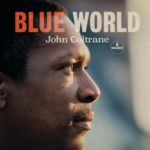True, the three versions of “Village Blues,” and two of “Naima,” stretch this eight-song set just long enough to qualify it as an album. And, all of the versions here, commissioned at the time of its June ’64 recording, were intended to be renditions of previously released Coltrane compositions recast as a soundtrack to Le chat dans le sac, a low-key French film, not as a new album. Still, it is a notable new entry in the Coltrane catalog, in the best possible way, as a collection of these originals as performed by his classic quartet, at the precise moment in his career when the saxophonist was moving away from such structure.
It’s an interesting intersection: Coltrane on the verge of the most avant garde two years of his career when he would set a torch to the barriers of modal jazz, and this request to revisit his earlier work. As an historical piece, it’s just as necessary to any Coltrane enthusiast as any of his other Impulse dates at Van Gelder’s New Jersey studio, arguably where he made his best music. As a listening experience, it’s sonically immaculate, as to be expected, and the multiple takes do offer the enticing compare-and-contrast exercises not only with each other, but with previously released versions.
To that end, Coltrane and his ensemble seem, surprisingly, more restrained. “Naima,” in both takes, has a gentler, brighter feel; not as deeply spiritual as the romantic ode it was when cut for Atlantic. So, too, “Like Sonny,” flutters more where its predecessor cut. “Traneing In” is probably the best example of Coltrane flexing, with the title track also allowing for more space, yet Coltrane appears to respect the purpose of the music: to support the film, rather than serve as a launching pad for his freeform improvisations .
Anytime there is unreleased material from Coltrane’s quartet years that surfaces, it’s worth a listen. The group and its leader were playing too well for anything to be dismissed. This record, in and of itself, is an oddity- the premise, song selection, and tone of performances- but is anything but odd. Instead, it should be considered as a valued and wholly unique moment in Coltrane’s career; as he traversed a bridge he would burn as he crossed, leaving this June ’64 quartet date as maybe the first and last time he sounded like this.



No Comments comments associated with this post